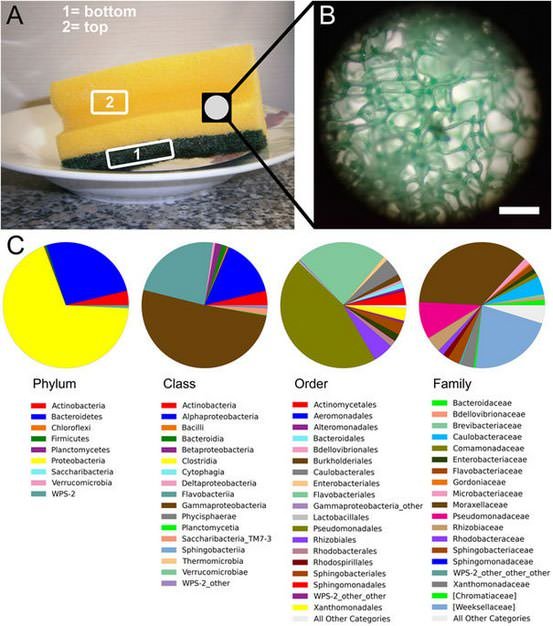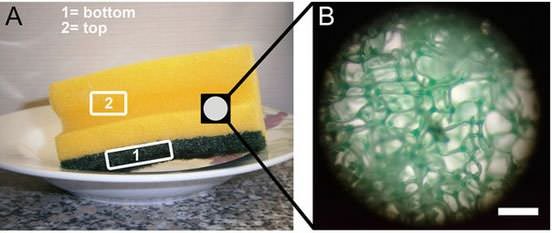Sanitation has been a big factor for the improvement of the overall health and well-being of humans. We spend 90% of our lifetimes within built environments wherein various microorganisms colonize and develop microbiomes. From huts in rural villages, to more confined areas, to extreme habitats -- microorganisms follow us everywhere.
Some of our habits, and the areas that are host to our behavior like kitchens and bathrooms, have a high potential to act as microbial incubators. Contrary to popular misconceptions, our kitchens have been demonstrated to have more microbes that our toilets (200,000x more). Kitchen sponges have the highest level of bacteria in the whole living environment, apart from the drain traps. Sponges are not only reservoirs for microorganisms, but they also act as disseminators of bacteria as they are used to wipe surfaces.
Kitchen sponges are very popular in our modern age. They conveniently hold more water and soap than a regular dishcloth, giving you more solvent power when you're scrubbing away at dirty dishes. Not only that, popular models of kitchen sponges have one side covered with a scrubbing pad made of metal or plastic.
The issue of high levels of microbes and bacteria in kitchen sponges has been known for a while. Some of the bacteria found in your kitchen sponge could be a close relative to pneumonia and meningitis, according to a new study recently published in Scientific Reports.
Researchers sequenced the microbial DNA of 14 kitchen sponges. They also tried to see if the sponges could be properly sanitized using microwave and boiling treatments to reduce the bacterial load. The effectiveness of reducing the bacteria using these methods works in the laboratory, but not so much in used kitchen sponges but still able to reduce the general amount of bacteria to more than 60%.

Pie charts showing the taxonomic composition of the bacterial kitchen sponge microbiome
Additionally, despite some of the bacteria going down, there are some pathogen-related bacteria that are more resistant to cleaning and will re-colonize areas that have been left empty. This is similar to what happens in our guts after an antibiotic treatment. Killing some bacteria opens up free space for others to move into, whether they are better bacteria or worse. Cleaning sponges doesn't really work, it can even make it more harmful as the worst bacteria proliferate.
Kitchen sponges have so much bacteria, that this study found more than 5 x 10^10 bacteria in a single cubic centimeter (cm³). Just to give an idea of how much bacteria outnumber humans, in that single cm³ there are 7 time more bacteria than humans on the planet. And the scientists also say that such high number per volume are only found in one other place they know of: feces. That's right, poop and sponges have the same quantity of bacteria per volume.
No need to freak out (yet). The solution is to replace your kitchen sponges every week. That way you limit the build up of bacteria and keep your exposure lower.
Personally, I don't like sponges, they are too soft. I don't like grabbing it and having soap foam out. I also like the grab and grit of cloths more. Although the scratch/scrub surface of sponges is handy when you have some touch backed/burned cleaning to do, I just have a scrub pad without a sponge.
Do you like to use a kitchen sponge to clean the dishes?
Do you prefer a sponge to a cloth?
Have you been keeping your sponges too long?
Will you switch over to a cloth instead of a sponge after reading this 'scary' post (hehe)?
Thank you for your time and attention. Peace.
References:
https://www.nature.com/articles/s41598-017-06055-9
https://www.ncbi.nlm.nih.gov/pubmed/12392526?dopt=Abstract
https://www.ncbi.nlm.nih.gov/pubmed/22984730?dopt=Abstract
https://www.ncbi.nlm.nih.gov/pubmed/22752336?dopt=Abstract
http://www.dailymail.co.uk/health/article-2235650/The-kitchen-sponge-200-000-times-dirtier-toilet-seat--lead-PARALYSIS.html
If you appreciate and value the content, please consider:
Upvoting  , Sharing
, Sharing  or Reblogging
or Reblogging  below.
below.



I prefer to use the plastic scrubbing pads (like scotch brite) even over cloths. I find the cloths have a tendency to hold grease and not rinse out well.
I've also taken to using a plastic scraper or squeegee on plates and bowls so they don't require as much scrubbing.
Nice, thanks for the sound advice :)
Thank you for the interesting although scary post. Getting rid of my smelly sponges!
Right on!
Yep. A lot of our ideas about the differences between clean and dirty are quite inaccurate. We carry our smartphone, we use it on the subway after touching doors, seats and ticket machines. Then we go home and wash our hands. And then we pick up our dirty smartphone with our clean hands again. And we do that for months without bothering to clean it. And then we get a call and press that thing to our faces. And most of us see no problem until it's pointed out.
Haha, yeah true. Public transpo and then trusted phone on the phone transference.
We bleach our sponges every use. I'm sure that won't kill everything but for the time we have them it helps. I stand them up and let them dry between uses. I try to get new ones every week or so. We mostly use cloth rags that have also been washed and bleached more often. I prefer the rags anyway. We also use the wadded plastic scrubbers to break things free. They clean up fairly easy and don't hold the bacteria as easily. Great article.
I don't like to use bleach, as that is toxic and goes back to the environment and us. Have you tried something natural, like vinegar?
Well we do use vinegar on a few things here. My wife uses a solution of vinegar and dish soap which she sprays on the shower to help remove hard water. Maybe we should try using vinegar on sponges or just get rid of sponges all together.
with sponge you can easily remove some sauce or any other hard to remove thing. Ye its true about microbes, but we usually see is plates white or not :) Also i think if use hot water then all will be ok , so we just need to boil microbes:)
Water and a rag/cloth easily remove sauce... lol. Thanks for the feedback.
Instead of replacing foams or sponges every week, microwaving them every week (why not every day?) for a minute or so will address this issue. And perhaps your cloth & hard scrub or wire mesh or whatever can also catch these germs after suing them for some time. They too need microwaving.
Microwaving doesn't get rid of them all, at 60% efficiency they say.
You scared me. I shall change the sponge more often than before=))
This Post was Added to the Steemit Social Media Queue.
Sweet, thanks.
I use the high pressure garden hose alot of the time, no cloth or spounge...super hygenic..
LOL... nice...
Eye opening!!! did not know how harmful more than a week old sponges could be!! That's all I use and surely more than a week 😖. Switching to cloth effective immediately !
I wonder of those long scrubby things are better or worse. Ours get tired looking after awhile and they seem infested with microbes. Time to file them in the circular file cabinet....
Español? Es bunghole! Habla, blah habla, habla habla, habla bunghole...
The issue of high levels of microbes and bacteria in kitchen sponges has been known for a while. @naz722
You copy/pasted a part of my post as a comment? lol I'll flag this.
Good catch @krnel 😜
Wow that takes nerve. No wonder he is a 7 . Seems he downvoted your downvote also. lol
Yes. This comment makes good sense so I've followed you.